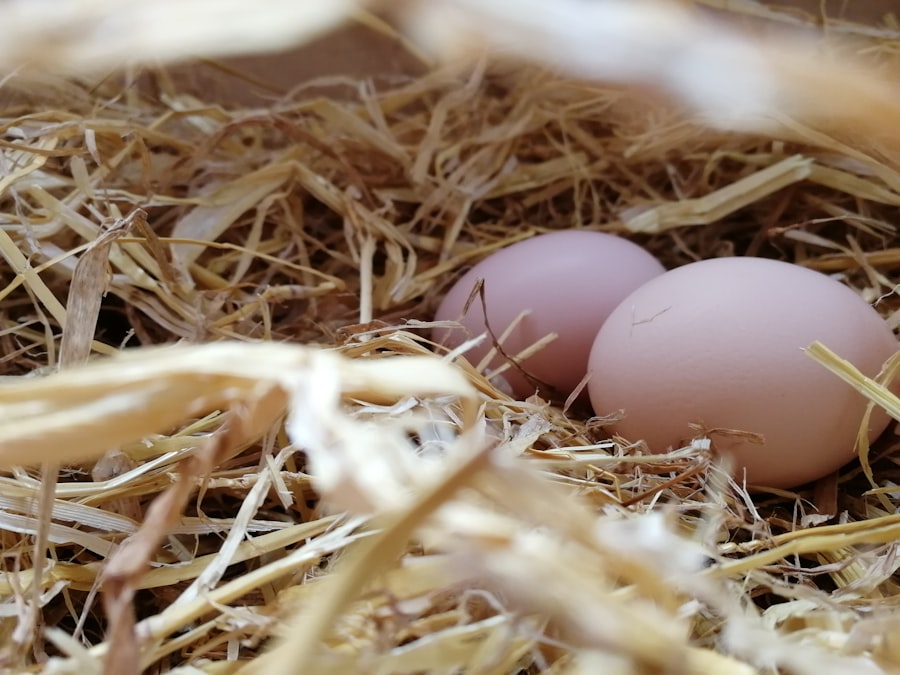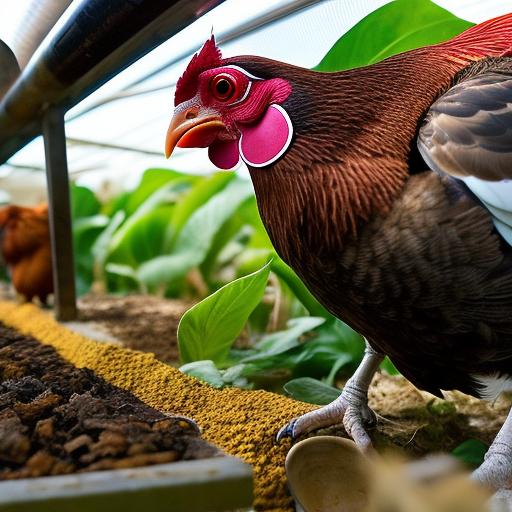Urban chicken keeping has become increasingly popular in cities across the United States, including Los Angeles. More and more people are recognizing the benefits of raising chickens in their backyard, from the availability of fresh eggs and meat to the educational opportunities it provides for children. However, it is important to understand the legality of keeping chickens in the city and the regulations that govern it. This article will explore the legality and benefits of urban chicken keeping in Los Angeles, as well as provide information on choosing the right breed, coop requirements, caring for chickens, common challenges, health and safety considerations, noise and odor regulations, community resources and support, and the environmental impact of urban chicken keeping.
Key Takeaways
- Keeping chickens in Los Angeles is legal, but there are regulations that must be followed.
- Urban chicken keeping can provide benefits such as fresh eggs, pest control, and educational opportunities.
- When choosing a breed of chicken for Los Angeles, consider factors such as climate and noise level.
- Coops and runs must meet certain requirements, such as being predator-proof and providing adequate space.
- Feeding and caring for chickens in the city requires attention to their diet and health needs.
The legality of keeping chickens in Los Angeles
Before embarking on the journey of urban chicken keeping, it is crucial to understand the regulations set forth by the city of Los Angeles. The city allows residents to keep chickens as long as certain requirements are met. These requirements include obtaining a permit and adhering to specific guidelines regarding coop size, location, and maintenance. It is important to familiarize oneself with these regulations to ensure compliance and avoid any potential legal issues.
In order to keep chickens legally in Los Angeles, residents must obtain a permit from the Department of Animal Services. The permit requires an annual fee and must be renewed each year. Additionally, there may be restrictions on the number of chickens allowed per property based on lot size. It is important to check with local ordinances and zoning regulations to ensure compliance with these requirements.
Benefits of keeping chickens in urban areas
There are numerous benefits to keeping chickens in urban areas like Los Angeles. One of the most obvious benefits is the availability of fresh eggs and meat. Chickens are prolific egg layers and can provide a sustainable source of protein for households. Additionally, raising chickens can also provide an opportunity for families to teach their children about responsibility, animal care, and where their food comes from.
Another benefit of urban chicken keeping is pest control. Chickens are natural foragers and can help control pests such as insects and rodents in the backyard. This can reduce the need for chemical pesticides and contribute to a healthier environment.
Furthermore, urban chicken keeping promotes sustainability and has a positive environmental impact. Chickens produce manure, which can be composted and used as fertilizer for gardens. This reduces the need for synthetic fertilizers and helps to create a more sustainable and eco-friendly backyard.
Choosing the right breed of chickens for Los Angeles
When considering urban chicken keeping in Los Angeles, it is important to choose the right breed of chickens that will thrive in the local climate and meet the specific needs of the urban environment. Los Angeles has a Mediterranean climate with mild, wet winters and hot, dry summers. Therefore, it is important to choose breeds that are heat-tolerant and can withstand the occasional cold temperatures.
Some popular breeds for Los Angeles include Rhode Island Reds, Australorps, and Leghorns. These breeds are known for their ability to handle heat well and are good egg layers. It is also important to consider space requirements, as some breeds require more room to roam than others. Additionally, considering temperament is crucial, especially if there are children or other pets in the household.
Coop and run requirements for keeping chickens in Los Angeles
In order to keep chickens in Los Angeles, it is important to provide them with a suitable coop and run that meets the city’s regulations. The coop should be secure, well-ventilated, and insulated to protect the chickens from predators and extreme weather conditions.
The size of the coop will depend on the number of chickens being kept. The city of Los Angeles requires a minimum of 2 square feet per chicken inside the coop and 4 square feet per chicken in the run. It is important to provide enough space for the chickens to move around comfortably and engage in natural behaviors.
Ventilation is crucial to prevent the buildup of moisture and ammonia inside the coop. This can be achieved through windows, vents, or fans. Insulation is also important to regulate temperature and protect the chickens from extreme heat or cold.
Security measures should be in place to protect the chickens from predators such as raccoons, coyotes, and neighborhood dogs. This can include secure fencing, locks on doors and windows, and burying wire mesh around the perimeter of the coop to prevent digging.
Waste management is another important aspect of coop and run requirements. It is important to have a system in place for managing chicken waste, such as a composting system or regular cleaning schedule. This will help maintain a clean and healthy environment for the chickens and prevent odor issues.
Feeding and caring for chickens in the city

Proper nutrition is essential for the health and well-being of chickens. A balanced diet should consist of a combination of commercial chicken feed, kitchen scraps, and foraging opportunities. Commercial chicken feed should be specifically formulated for the age and type of chickens being kept.
Fresh water should be available at all times to ensure hydration. Chickens can drink a surprising amount of water, especially during hot weather, so it is important to regularly check and refill their water containers.
Health and wellness considerations are also important when caring for chickens in the city. Regular health checks should be conducted to monitor for signs of illness or injury. It is also important to provide appropriate shelter, protection from extreme weather conditions, and access to dust baths for natural grooming.
Egg collection and storage should be done regularly to ensure freshness. Eggs should be collected daily and stored in a cool place away from direct sunlight. It is important to clean eggs before storage to remove any dirt or debris.
Common challenges of urban chicken keeping in Los Angeles
While there are many benefits to urban chicken keeping in Los Angeles, there are also some common challenges that may arise. One of the main challenges is dealing with predators and pests. Los Angeles is home to a variety of predators, including raccoons, coyotes, and neighborhood dogs, which can pose a threat to chickens. It is important to implement security measures such as secure fencing and locks to protect the chickens from these predators.
Another challenge is noise and odor complaints from neighbors. Chickens can be noisy, especially during the early morning when they are laying eggs. Additionally, chicken waste can produce odors if not properly managed. It is important to be considerate of neighbors and take steps to minimize noise and odor issues, such as keeping the coop clean and well-maintained.
Zoning and property restrictions can also pose challenges for urban chicken keepers in Los Angeles. Some neighborhoods may have specific regulations or restrictions on keeping chickens, so it is important to check with local ordinances and zoning regulations before starting a backyard flock.
Lastly, weather and climate challenges can affect the health and well-being of chickens. Los Angeles experiences hot, dry summers and occasional cold temperatures in the winter. It is important to provide appropriate shelter, ventilation, and insulation to protect the chickens from extreme weather conditions.
Health and safety considerations for chickens and humans
When keeping chickens in an urban environment like Los Angeles, it is important to prioritize the health and safety of both the chickens and humans involved. Disease prevention and treatment should be a top priority. This includes regular health checks, vaccinations if necessary, and proper biosecurity measures to prevent the spread of diseases.
Biosecurity measures should include practices such as limiting contact with other poultry, disinfecting equipment and footwear, and quarantining new birds before introducing them to the existing flock. This will help prevent the introduction and spread of diseases.
Safe handling and disposal of waste is also crucial for maintaining a healthy environment. Chicken waste should be properly managed and disposed of to prevent the spread of bacteria and parasites. It is important to wear personal protective equipment such as gloves and masks when handling chicken waste to protect against potential health risks.
Noise and odor regulations for urban chicken keeping in Los Angeles
Los Angeles has specific regulations regarding noise and odor complaints related to urban chicken keeping. It is important to familiarize oneself with these regulations to avoid any potential legal issues or conflicts with neighbors.
The city of Los Angeles has noise regulations that prohibit excessive noise between the hours of 10 PM and 7 AM. This includes noise from chickens, such as crowing or clucking. It is important to take steps to minimize noise, such as providing a quiet and secure coop, keeping the coop clean and well-maintained, and considering the placement of the coop in relation to neighboring properties.
Odor complaints can also be a concern when keeping chickens in an urban environment. Chicken waste can produce odors if not properly managed. It is important to regularly clean the coop and run, provide proper ventilation, and implement waste management practices such as composting to minimize odor issues.
Community resources and support for urban chicken keepers in Los Angeles
There are numerous community resources and support available for urban chicken keepers in Los Angeles. Local organizations and clubs, such as the Los Angeles Urban Chicken Enthusiasts, provide a platform for sharing information, resources, and experiences with other chicken keepers in the area.
Online forums and resources, such as Backyard Chickens and Urban Farming, offer a wealth of information on topics ranging from breed selection to coop design to health care. These online communities provide a space for asking questions, seeking advice, and connecting with other like-minded individuals.
Workshops and classes are also available for those interested in learning more about urban chicken keeping. Local organizations often host workshops on topics such as coop building, chicken health care, and sustainable practices. These workshops provide hands-on learning opportunities and a chance to connect with other chicken keepers in the community.
Networking opportunities, such as chicken coop tours or meet-ups, allow urban chicken keepers to connect with others in their area and share ideas and experiences. These events provide a sense of community and support for those interested in urban chicken keeping.
The environmental impact of urban chicken keeping in Los Angeles
Urban chicken keeping in Los Angeles has a positive environmental impact in several ways. One of the main benefits is the reduction of food waste. Chickens are excellent at consuming kitchen scraps and leftovers that would otherwise end up in the landfill. By feeding these scraps to chickens, not only are they being utilized as a valuable food source, but it also reduces the amount of waste that needs to be disposed of.
Additionally, chickens produce manure, which can be composted and used as fertilizer for gardens. This reduces the need for synthetic fertilizers, which can have negative environmental impacts. Chicken manure is rich in nutrients and can help improve soil health and fertility.
Furthermore, urban chicken keeping contributes to a reduction in carbon footprint. By raising chickens for eggs and meat in the backyard, there is a decrease in the demand for commercially produced eggs and meat that require transportation and energy-intensive processes. This helps to reduce greenhouse gas emissions associated with industrial agriculture.
Lastly, urban chicken keeping promotes biodiversity and ecosystem benefits. Chickens help control pests such as insects and rodents, reducing the need for chemical pesticides. They also contribute to a more diverse backyard ecosystem by attracting beneficial insects and birds.
In conclusion, urban chicken keeping in Los Angeles offers numerous benefits, from fresh eggs and meat to educational opportunities for children. However, it is important to understand the legality of keeping chickens in the city and adhere to the regulations set forth by the city. Choosing the right breed of chickens, providing suitable coop and run requirements, and properly caring for chickens are all crucial aspects of urban chicken keeping.
While there may be challenges such as predators, noise and odor complaints, zoning restrictions, and weather challenges, there are resources and support available to help navigate these issues. It is important to prioritize the health and safety of both the chickens and humans involved, and to be mindful of noise and odor regulations to maintain positive relationships with neighbors.
Urban chicken keeping in Los Angeles also has a positive environmental impact, including the reduction of food waste, fertilizer production, carbon footprint reduction, and biodiversity and ecosystem benefits. By participating in urban chicken keeping, individuals can contribute to a more sustainable and eco-friendly city.
In conclusion, urban chicken keeping in Los Angeles offers numerous benefits and opportunities for individuals and communities. It is important to understand the legality, regulations, and requirements of keeping chickens in the city, as well as the benefits and challenges that come with it. By following the guidelines and taking advantage of community resources and support, individuals can successfully raise chickens in an urban environment while promoting sustainability and environmental stewardship.
If you’re wondering whether you can keep chickens in Los Angeles, you’ll be pleased to know that it is indeed possible! In fact, there are many resources available to help you get started. One such resource is an informative article on Poultry Wizard’s website, which provides valuable insights into the world of chicken keeping. This article discusses the importance of having a suitable chicken coop, and it even highlights the benefits of using the Producers Pride Sentinel Chicken Coop. If you’re curious about how many chickens you would need for a family of four, Poultry Wizard has got you covered with another helpful article. So, whether you’re interested in finding the perfect chicken coop or determining the ideal number of chickens for your family, these articles will provide you with all the information you need to embark on your chicken-keeping journey. Check out this article to learn more!
FAQs
What are the rules and regulations for keeping chickens in Los Angeles?
According to the Los Angeles Municipal Code, residents are allowed to keep up to five chickens on their property as long as they are kept in a coop or enclosed area and are not causing a nuisance to neighbors.
Do I need a permit to keep chickens in Los Angeles?
No, you do not need a permit to keep chickens in Los Angeles as long as you follow the rules and regulations set by the city.
What kind of housing do I need for my chickens?
Chickens must be kept in a secure coop or enclosed area that is at least 2 square feet per chicken. The coop must have a solid roof, walls, and a floor, and be well-ventilated. The chickens must also have access to a fenced outdoor area that is at least 20 square feet per chicken.
What kind of food and water do chickens need?
Chickens need a balanced diet of chicken feed, grains, and fresh water. They also enjoy treats such as fruits and vegetables.
What are the benefits of keeping chickens in Los Angeles?
Keeping chickens can provide fresh eggs, natural pest control, and fertilizer for your garden. It can also be a fun and educational hobby for families and individuals.
Meet Walter, the feathered-friend fanatic of Florida! Nestled in the sunshine state, Walter struts through life with his feathered companions, clucking his way to happiness. With a coop that’s fancier than a five-star hotel, he’s the Don Juan of the chicken world. When he’s not teaching his hens to do the cha-cha, you’ll find him in a heated debate with his prized rooster, Sir Clucks-a-Lot. Walter’s poultry passion is no yolk; he’s the sunny-side-up guy you never knew you needed in your flock of friends!







